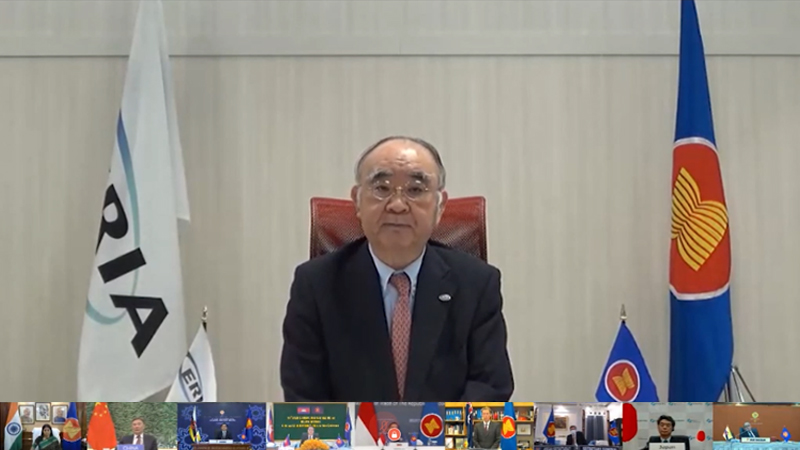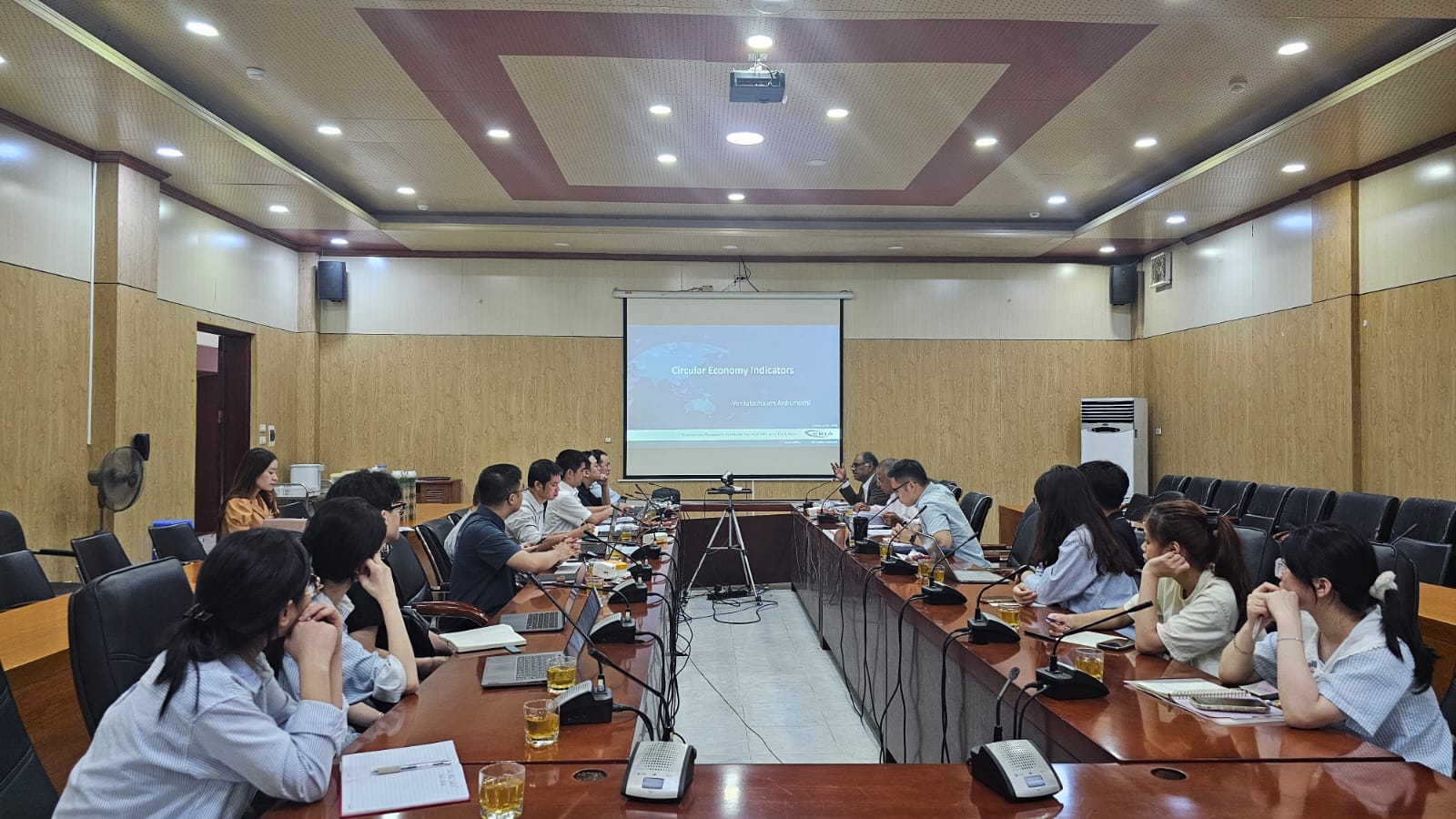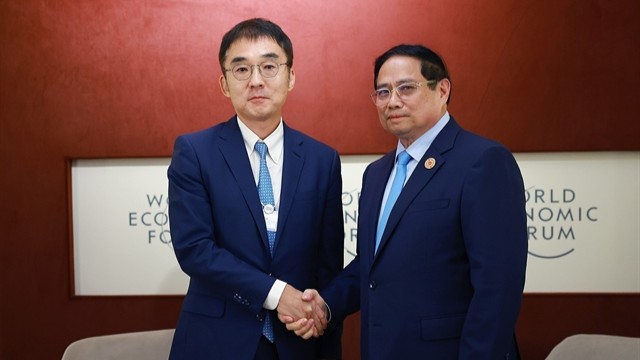ERIA Participates in the 53rd ASEAN Economic Ministers’ and Related Meetings
Date:
15 September 2021Category:
NewsTopics:
ASEAN, ASEAN Economic CommunityShare Article:
Print Article:
Jakarta, 8-15 September 2021: The 53rd ASEAN Economic Ministers (AEM) Meeting, the 9th East Asia Summit (EAS) Economic Ministers’ Meeting (EMM) and other related meetings were held virtually between 8-15 September 2021. Prof Hidetoshi Nishimura, the President of ERIA, presented ERIA’s paper on ‘Supply Chain Resilience and Post-Pandemic Recovery in East Asia Summit Region’ to the EAS Economic Ministers on 15 September 2021.
In the Joint Media Statement of the 53rd ASEAN Economic Ministers Meeting, ERIA was commended for its continued support and contribution towards ASEAN regional economic integration and ASEAN Economic Community (AEC) building efforts:
Economic Research Institute for ASEAN and East Asia (ERIA)
- The Meeting thanked ERIA for its continued support and contribution to ASEAN economic integration and AEC-building efforts, the most notable of which is the support it has given in the development of Brunei Darussalam’s two PEDs, i.e., the Framework on Circular Economy under the AEC and the Non-Tariff Measures (NTMs) Cost-Effectiveness Toolkit for ASEAN (NTM Toolkit), which was done in cooperation with UNCTAD. The Meeting noted that through its research activities, ERIA has also contributed studies on, among others, (i) an Assessment of the Impact of the ATIGA on Intra-ASEAN Trade, which is a component of the ATIGA General Review; (ii) Enhancing the Utilisation of ASEAN MRAs in Facilitating Mobility of Professionals in ASEAN, which includes identifying existing regulatory barriers to mobility of professionals in AMS; (iii) the Impact of Fourth Industrial Revolution (4IR) on Evolving Services Trade Landscape and Mobility of Professionals, which would encourage improvement in movement of ASEAN professionals in ASEAN; (iv) the follow-up study on ASEAN Seamless Trade Facilitation Indicators and Trade Transaction Cost (ASTFI-TTC II) that would help determine the reduction by 10% in trade transactions cost in the region by 2020; and (v) “UK-ASEAN Trade: Strengthening the Supply Chain Linkages” - a study of UK-ASEAN supply chains that emanate from ASEAN’s regional objectives and frameworks for strengthening and deepening ASEAN’s economic resilience. ERIA, in cooperation with the Coordinating Committee on Services (CCS) and the ASEAN Business Sectors Working Group, is also undertaking further review of the domestic regulations and mapping the issues affecting the mobility of ASEAN professionals, to facilitate the movement of ASEAN Professional and enhancing the utilisation of ASEAN Mutual Recognition Arrangements. ERIA also continued to support capacity building to AMS officials related to services sectors to contribute towards developing their respective Schedules of Non-Conforming Measures under the ATISA.
Ninth EAS Economic Ministers’ Meeting, 15 September 2021
Prof Nishimura presented ERIA’s paper on ‘Supply Chain Resilience and Post-Pandemic Recovery in East Asia Summit Region’. The paper was prepared pursuant to the mandate given by the Economic Ministers during the Eighth East Asia Summit – Economic Minister Meeting (EAS EMM) in 2020. In his opening remarks, he shared ERIA’s research findings:
- So far, the pandemic has not disrupted the production system and trade patterns in the EAS region;
- ASEAN countries maintained their relative importance in the world trade network; and
- private dynamism in the EAS region during the pandemic has remained vigorous where firms are found to perform well and have a good outlook because they have adapted well to the COVID-19 shocks by quickly rearranging their supply chains.
Prof Nishimura also outlined ERIA’s proposed measures in achieving resilient supply chain in the region which is based on three supply chain key areas: enhancing supply chains for essential goods, scaling-up digitalization of supply chain, and enhancing the sustainability and circularity of supply chain.
First, under the enhancing supply chain for essential goods, the East Asia Member Countries (EASMC) should approach the measures by:
- consulting with the private sector to establish a list of essential components used extensively in their production and trade;
- considering replicating initiatives from the Memorandum of Understanding on the Implementation of Non-Tariff Measures on Essential Goods;
- conducting an in-depth assessment of supply chains risks in the region; and
- working together to eliminate trade barriers in essential goods for example, in the vaccine supply chain.
The aim of the first measure is to secure the supply chains to limit the exposure to shortages of essential products in the EAS region.
Second, under the digitalization measure, the EASMC may consider re-thinking their GVC strategies by accelerating digitalization that was already underway. Digitalized supply chain is easier to monitor and will increase the ability to respond to future shocks. This could be done through:
- strengthening cooperation to facilitate supply chain automation and management;
- enhancing e-commerce and digital investment;
- promoting data governance and enhancing security in digital economy; and
- improving human resources by developing digital literacy and skills.
Market mechanisms should be the main engine of digital transformation, with policy intervention facilitating this process. Thus, region-wide cooperation in ICT development and digital trade facilitation, with strong support by markets and business councils, is therefore imperative.
The third important measure is to enhance the sustainability and circularity of supply chains. The EASMC must step up efforts not only to build stronger and smarter supply networks but also to balance between resilience, sustainability, and efficiency in production through:
- strengthening industrial policy to expand green businesses and accelerate green innovation;
- facilitating the transition to sustainable energy systems which are essential for industries and economic growth leading to low carbon economy; and
- accelerating the shift towards circularity transformation by initiating regional discussions on various circular economy issues.
Good ASEAN initiatives such as the ASEAN Framework on Circular Economy could also be emulated as ASEAN Member States are geared towards transitioning into a circular economy.
In conclusion, Prof Nishimura pointed out that to be better prepared for future crises, stronger, more resilient, and flexible supply chain structures would need to be in place. No country can efficiently address the complexities of supply chains in isolation, hence, international cooperation remains urgent. Therefore, he urged for the EASMC to consider as follows:
- Remaining committed to an open, free, fair, non-discriminatory, inclusive, and rules-based multilateral trading system and maintain its competitiveness to attract global investment.
- Continuing to implement policy reforms that:
- Promote sustainable, transparent, quality infrastructure development in accordance with international standards;
- Strengthen connectivity and invest in human capital and technology;
- Enhanced trade facilitation; and
- Achieve macroeconomic stability.
- Continue to provide a predictable economic environment that creates a favourable investment climate and connectivity for private companies to contribute to further expand international production networks and share the benefits for workers and businesses alike from the GVC integration.
ERIA was honoured that the Joint Media Statement of the Ninth EAS Economic Ministers’ Meeting noted ERIA’s significant contributions to the region:
- The Meeting commended Economic Research Institute for ASEAN and East Asia (ERIA) for its significant contribution, through the studies and research activities that support regional economic issues. The Meeting noted ERIA’s paper on “Supply Chain Resilience and Post-Pandemic Recovery in the East Asia Summit region”. Re-emphasizing the need for greater collaboration to deal with the adverse impact of the COVID-19 pandemic, the Meeting welcomed ERIA to continue supporting the EAS process through its research.








